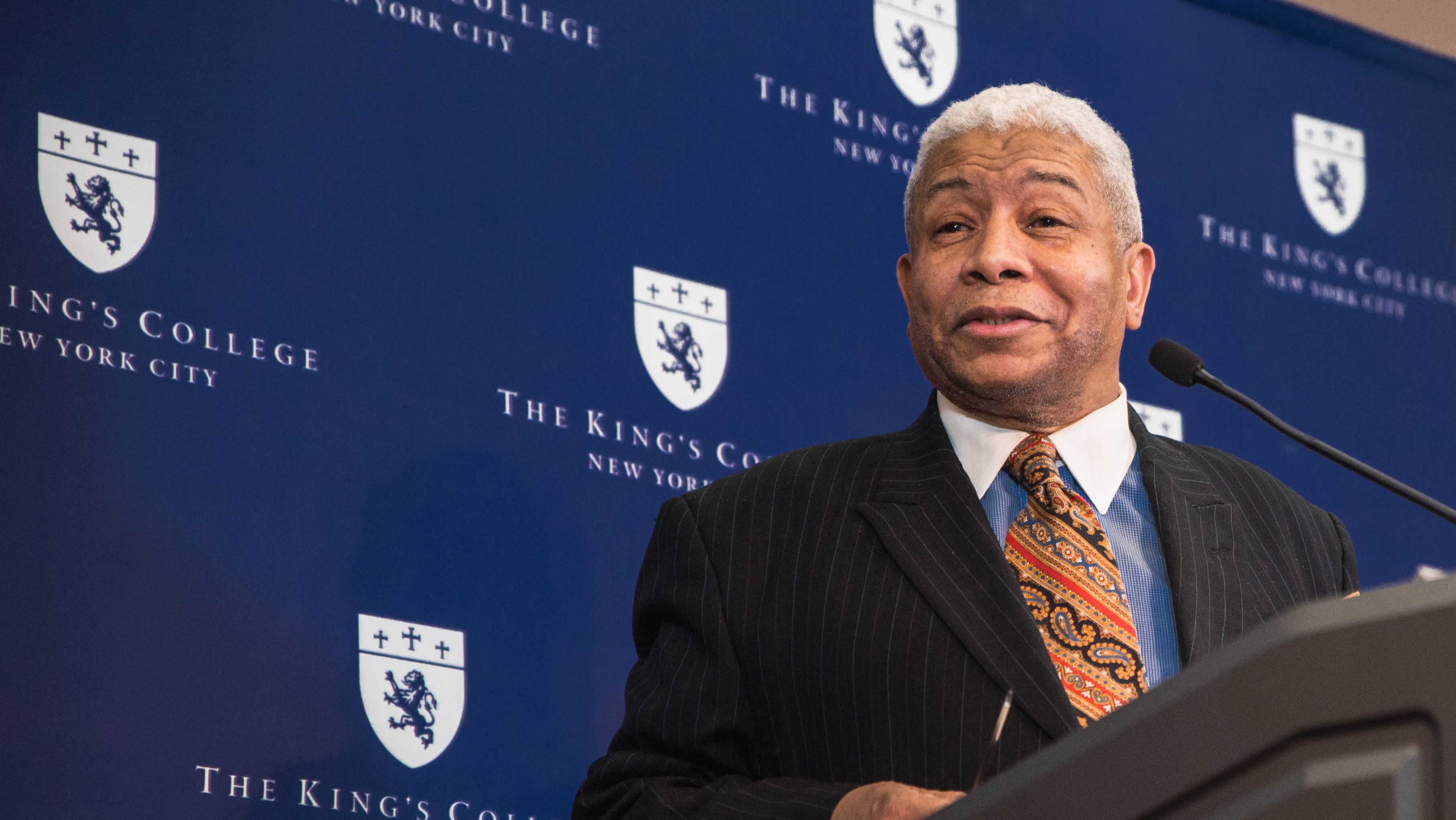Rev. Eugene Rivers Reviews MLK’s Legacy and the Task of Reconciliation
On February 5, 2018, The King’s College in New York City was honored to host the Rev. Eugene Rivers as this year’s Black History Month speaker.

On February 5, 2018, The King’s College in New York City was honored to host the Rev. Eugene Rivers as this year’s Black History Month speaker. Rivers, described by Chancellor Gregory Alan Thornbury as “a dramatically accomplished man,” is a widely published writer, world-renowned speaker, and community activist whose career extends over thirty-five years. Rivers served as an advisor for both Bush administrations and for the Clinton administration on both domestic and foreign policy issues, working on faith-based initiatives in America and on the AIDS crisis in Africa. He is a regular guest at top universities around the world, bringing his perceptive and Christ-centered message of reconciliation, advocacy, and justice to thousands of people each year.
Rivers’ talk was high-energy and engaging, tackling the challenging question of racial reconciliation in America. The talk wove together two narratives: first, the significance of Rev. Martin Luther King Jr. as a voice for spiritual change in America, not simply political change, and second, the shift in evangelicalism over the past fifty years, which he argued has done more to exacerbate than to heal racial divisions.
The first half of the talk focused on King’s theological and biblical perspective on racism in America. Rivers argued that American Christians who wish to be a part of reconciliation between white and Black Americans must realize that the battle is taking place in the spiritual realm, not simply in the political or social realm. “The crisis of slavery,” he said, “is part of a deeper battle in the spiritual realm.” Rivers pointed out that King was keenly aware of this dimension of the struggle, but he was one of only a few who did. Since his death, this aspect of his work has been neglected.
If King was correct, and there is a deeper spiritual meaning behind the Civil Rights Movement and the quest for racial equality in America, Rivers says that we must understand white supremacy as a demonic force, not merely a political one. To think of this as merely a political issue is “inadequate and conceptually inappropriate,” he said. When we witness social, cultural, and political injustice, we must seek to understand it in terms of the biblical idea of spiritual warfare, of principalities and powers that are manifested through human political activity but are not confined to that activity.
Hatred, Rivers said, is a “demonic force,” and in order to overcome it, we must combat it with a spiritual force of greater strength. The weapons available to us are “prayer, forgiveness, and love.” It is with these weapons that we must engage with racial inequality and injustice in America, or, Rivers warned, we will not succeed, because we will not be addressing the root of the problem.
“We have been called by God as Christians to engage in thinking about all political and social situations through the lens of the Holy Spirit,” Rivers said. Here he transitioned to speaking about the problem of evangelicalism, which he identified as the evangelical church in America splitting along partisan lines. American evangelicalism’s choice to engage in partisan political power-struggles, Rivers said, has compromised the church’s witness. Christians who seek to bring justice to bear on social inequalities must cease to think of themselves primarily in partisan terms—as white or Black, as left-wing or right-wing—and must think of themselves first and foremost as Christians. It is only through this radical reimagining of ourselves as essentially servants of God and warriors in a spiritual battle that we will be able to bring about change in political and social spheres.
In the Q&A time that followed, Rivers summarized how each person can work towards racial reconciliation through the following three actions: (1) love, which involves true forgiveness; (2) truth, which requires us to educate ourselves on some of the darker realities of American history and to be courageous enough to speak about those realities; and (3) prayer, which calls us to pray for people with whom we do not agree. These are the tools King used in his fight for justice, and they are tools that are readily available to all Christians.
Jackson Kane (PPE ’20) attended the lecture and came away deeply impressed. “The lecture was a powerful mix of indictment and education,” he said. “Often lectures like this are an information dump with few takeaways. Rev. Rivers instead inspired a spirit in everyone to change the way they live by challenging us to rethink our role in reconciling race relations.”
Watch the Black History Month Address by Rev. Eugene F. Rivers III




